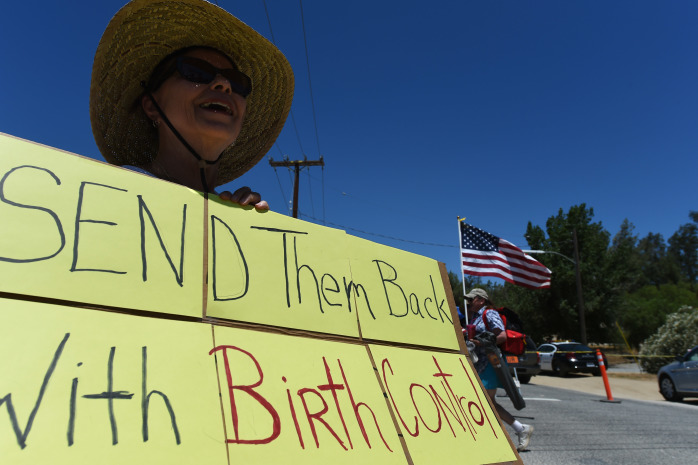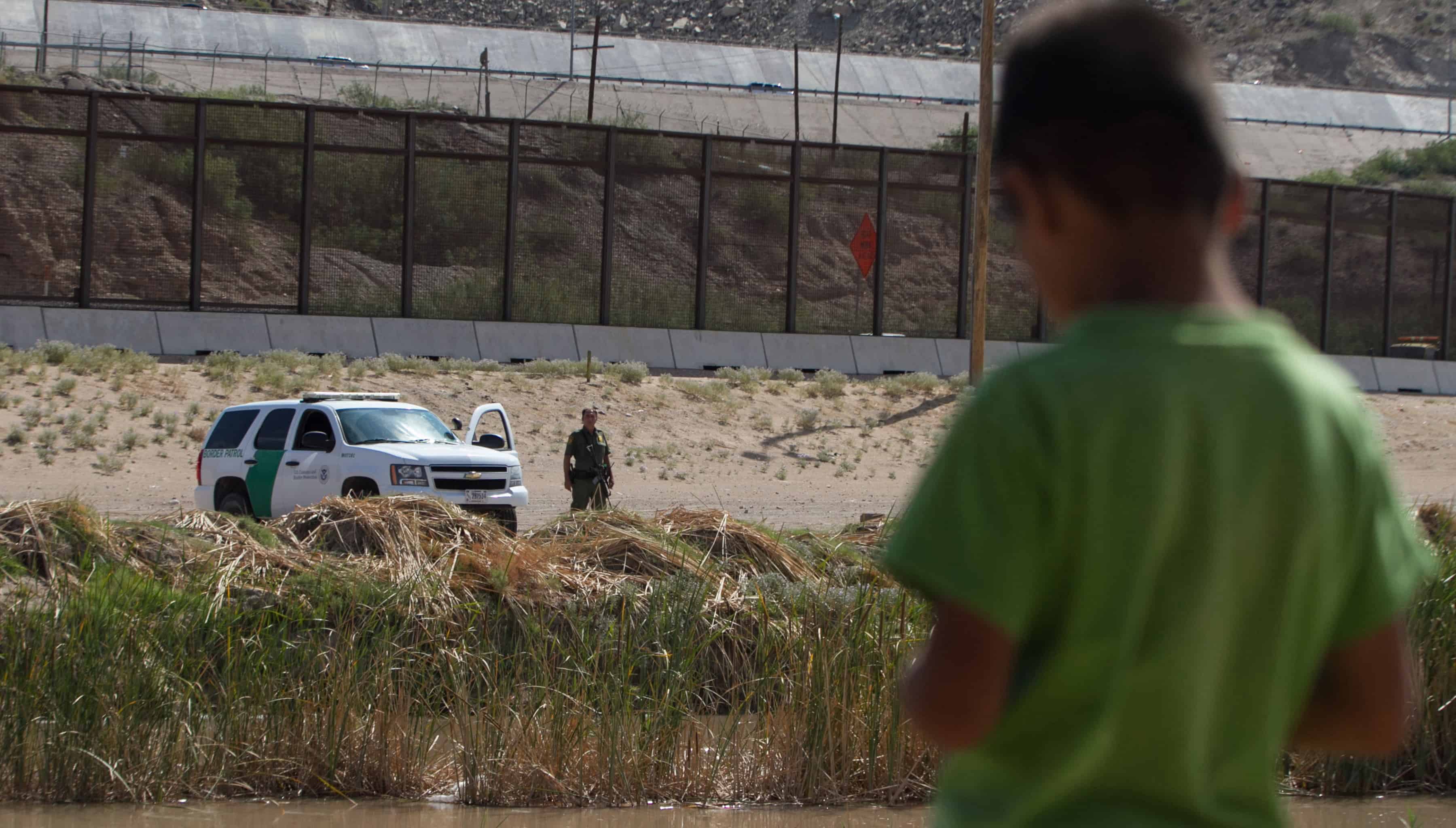WASHINGTON, D. C. – The foreign ministers of three Central American nations – appearing jointly at a Washington conference on immigration policy – today urged the United States to protect the welfare of all children trying to cross the U.S.-Mexico border while helping their governments fight the poverty, gangs and drug-fueled violence that forces these unaccompanied minors to flee their countries in the first place.
Mireya Agüero de Corrales of Honduras, Hugo Martínez of El Salvador and Luis Fernando Carrera Castro of Guatemala spoke at the Woodrow Wilson International Center for Scholars ahead of tomorrow’s White House meeting between U.S. President Barack Obama and Presidents Juan Orlando Hernández (Honduras), Salvador Sánchez Cerén (El Salvador) and Otto Pérez Molina (Guatemala).
At issue are the more than 57,000 minors who have arrived at Texas border posts in the first nine months of this fiscal year, with the total number likely to hit 90,000 by fall. Most of these kids are from the three countries whose presidents will meet tomorrow with both Obama and U.S. Vice President Joe Biden.
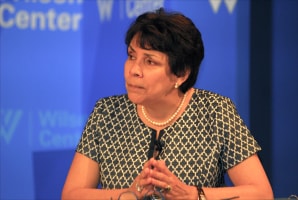
The Obama administration is asking Congress for $3.7 billion in emergency spending to deal with this surge of children traveling through Mexico alone to reach the U.S. border. An official White House statement said the meeting “will include discussion of how the United States and Central American governments are cooperating to promote safe, legal and orderly migration between our countries in a spirit of shared responsibility.”
Yet the influx has ignited a firestorm of angry rhetoric from Republicans, who accuse the president of turning a blind eye as Texas and other border states are overwhelmed by migrant children.
The humanitarian crisis is so high-profile that 250 people crammed into the Wilson Center’s sixth-floor auditorium and two overflow rooms to attend Thursday’s program, which was moderated by Steve Inskeep, host of NPR’s Morning Edition; another 170 watched the conference online.
“I can recall no time since the Central American wars of the 1980s when so much U.S. media attention has been paid to this region,” said Cynthia Arnson, director of the think tank’s Latin American program, in introducing the three foreign ministers.
“These children come from an extremely violent region, where they probably perceive that the risk of traveling to the U.S. is preferable to remaining at home,” she said. “Poverty levels have gone down, but 45 percent of Salvadorans, 55 percent of Guatemalans and 67 percent of Hondurans are still poor. There is no magic bullet to address these problems, which have taken decades, if not centuries, to develop.”
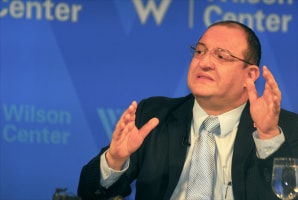
Agüero, whose country ranks first in the number of Central American child migrants crossing the border, said the crisis isn’t only the responsibility of Hondurans.
“This problem is all-encompassing, and it ties into the tragedy of our country being a transit point for drug traffickers and organized crime,” she said, estimating that 80 percent of the cocaine shipped or flown from South America to the United States passes through Honduras. Agüero’s country is already plagued with the world’s highest homicide rate – 79 per 100,000 inhabitants in 2013, down from 85.5 per 100,000 in 2012.
“Our data show that 70 percent of the homicides in Honduras are related to drug trafficking,” she said. “We need to work together to break this vicious cycle. How much as governments can we actually do to attract investments and create jobs? The first thing is to focus on containing violence in order to create a much safer environment, so that there is trust in state institutions – which have also been undermined by organized crime. We accept that fact, and we’re working on it.”
Yet Agüero pointed out that as the U.S. tightens border controls, illegal trafficking networks simply become more sophisticated.
“My view as a woman, perhaps, is more humanitarian in nature. We’re talking about children and families that are being broken,” she said. “We need to be logical. What have we gotten out of this strengthening and hardening of the border? If the U.S. had decided to give 10 percent [of what’s been spent on border security] to employment programs or maquilas, our history today would be different.”
Carrera said various factors have converged to bring the crisis to today’s levels.
“The coyotes are able to convince families that if they send their children [to the United States], they’ll be able to stay,” he said, estimating that these coyotes charge anywhere from $2,500 to $8,000 per child. “This business is so profitable that in the last year, the number of coyotes has grown exponentially.”
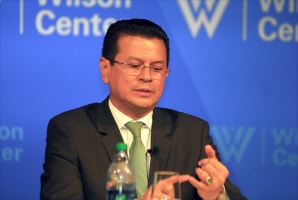
Even so, the largest migration of Guatemalans to the U.S. took place between 2001 and 2008, and it stopped with the financial crisis that shattered the U.S. economy in 2008.
“Before that, 150,000 Guatemalans were coming in every year, and there were a number of factors for this,” he said. “Chief among them was the U.S. economy, which was creating jobs. There was a demand for workers. Another element is that Hurricane Mitch and two or three other tropical storms hit our country, contributing to a rise in immigration. There was also a drop-off in Mexican immigration to the U.S., meaning the coyotes had to make up for that loss of business by bringing in Central Americans.”
Carrera said his government is working an arrangement with neighboring Mexico to allow Guatemalans to stay up to three days in Mexico without a visa, as long as they remain within 80 kilometers of the border. In addition, the Guatemalan government is constructing 10 formal crossing points along its 870-kilometer border with Mexico.
“Our model is the U.S. border station at McAllen, Texas,” said Carrera, who visited McAllen last month. “Each crossing will cost us $35 million, which is a lot of money for us, but it’s going to be worth it. In five years, we’ll have all of this already in place.”
He added: “We must immediately stop this flow of children. This is a humanitarian measure to protect them, not to stop migration [in general]. Illegal groups are handling these children, and we cannot let that happen.”
El Salvador’s Martínez said he saw this problem coming as early as 2011.
“We called for a Central American strategy to combat crime and improve law enforcement. About $3 billion needed to be invested at that time,” he recalled. “Money was pledged, but the execution of these projects has been much less than our needs. What we have suggested to the U.S. is a partnership for the prosperity of these countries – which ultimately leads to the prosperity of the United States.”
Martínez said, “This isn’t a matter of finding guilty parties” but of “acting in the short term” to address the current crisis.
“The sheer size of transnational crime is not something that can be tackled in isolation by one government. Organized crime does not respect laws or borders,” he said. “One country operating alone will not be able to eradicate the problem.”
Martínez urged the Obama administration to “attack the structural problems of migration” by encouraging investment in El Salvador and neighboring countries, as well as vocational training for young people so that they won’t want to emigrate.
“If these individuals had had opportunities back home, many of them would have never come to the United States,” he said. “We always say that we want migration to be an option, not an obligation.”
